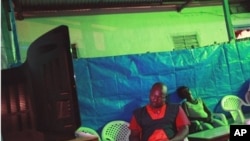Ivory Coast's electoral commission is today expected to finish releasing provisional results from Sunday's presidential election. Returns so far show the country's current president and its former prime minister leading a field of 14 candidates.
Ivory Coast's electoral commission says it will meet Wednesday's deadline for releasing all of the provisional results. With more than half the votes counted, President Laurent Gbagbo and former prime minister Alassane Ouattara each have just over a third of the ballots cast.
Electoral commission spokesman Bamba Yacouba began announcing results on state television late Tuesday, starting with returns from the north-central Vallee du Bandama region.
Yacouba explained how many voters were registered, how many people voted, how many ballots were disqualified, and how many people voted for each candidate.
A tally of the returns announced so far shows President Gbagbo with about 37 percent and Ouattara with about 34 percent. Former President Henri Konan Bedie is third with 27 percent. If those trends continue, no one will win an outright majority in this first round, so there will be a run off between the top two finishers later this month.
The vote is meant to reunite the country eight years after the start of civil war. It was held in areas both under government control and in parts of the north that remain under the command of a former rebel movement.
Before the announcement of electoral returns, Ivory Coast's army chief of staff, General Philippe Mangou, appealed for calm, saying a combined force of government troops and former rebels is in place to prevent post-electoral violence.
The wait for results added to the country's political tension, with many shops in Abidjan staying closed or closing early and people stockpiling food and fuel in case of trouble.
Former Ghanian President John Kufuor is an election observer with the Carter Center. He says the post-conflict rules of this vote gave the election commission more time to ensure that its results are solid enough to withstand any challenge.
"The electoral commissioner was given up to three days to declare," he said. "It must have been in the wisdom of the lawmakers that there should be this drawn out period because of where the country was coming from. It is a country that had been in civil war with great losses. And, we generally know that during elections, people's moods tend to get frayed. And so the makers must have considered imposing this long drawn period for declaration of the results, so the electoral commission would have some space to do their work thoroughly. So, let's really give them the chance."
With the announcement of complete results, the top two finishers will better understand where they did well and where they need alliances with former rivals to improve their vote totals for the second round. President Gbagbo enjoys the advantages of incumbency. Ouattara and Bedie have already pledged to join forces in a runoff against the president.
Related report from VOA's English to Africa "In Focus" program










